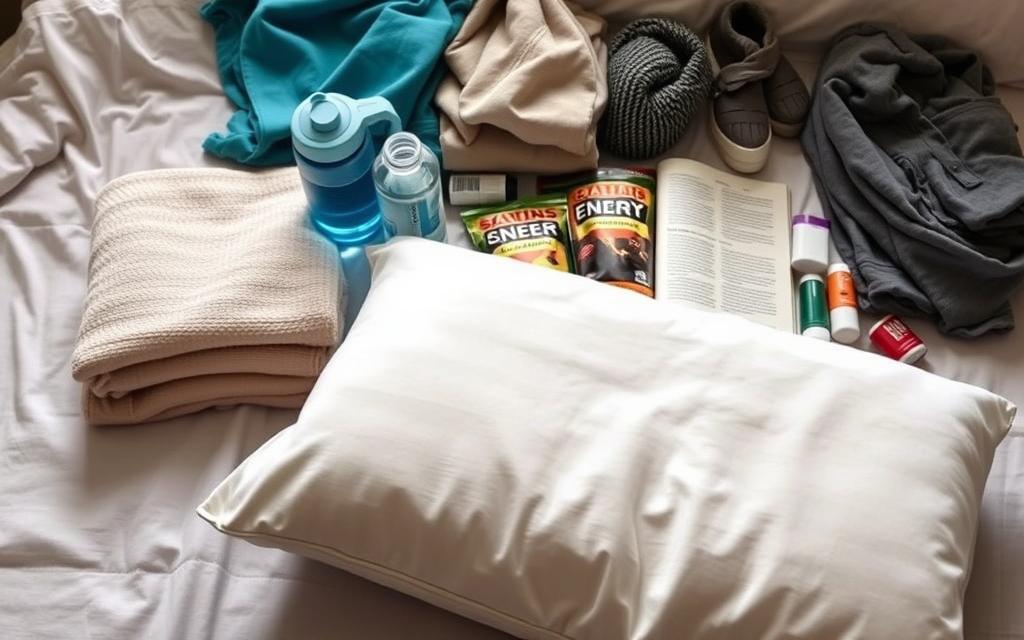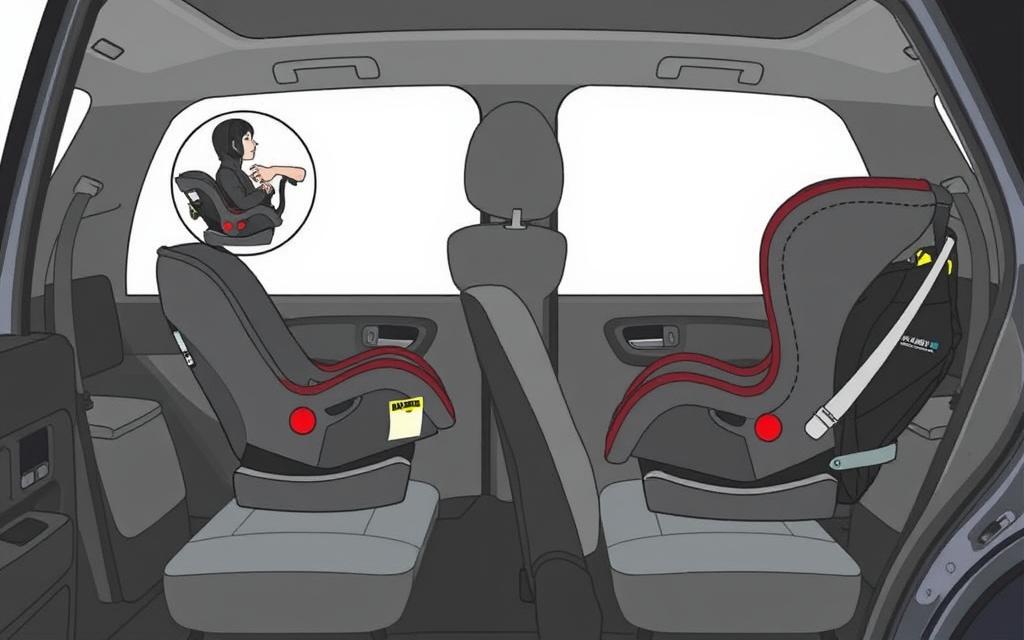“Hospital Bag Essentials: Your Ultimate Packing Checklist”
Advertisements
Preparing for your hospital stay during childbirth requires thoughtful planning and organization to ensure you have everything you need during this significant life event.
A well-packed hospital bag can make a substantial difference in your comfort and peace of mind during labor, delivery, and the postpartum period.
This comprehensive guide will walk you through exactly what to include in your hospital bag and when to pack it, ensuring you’re fully prepared for your baby’s arrival.
Advertisements
Key Takeaways
- Understand the essentials to pack for a comfortable hospital stay
- Learn when to pack your hospital bag
- Discover what the hospital provides versus what you should bring
- Get insights on comfort items and postpartum necessities
- Find out what to pack for your partner and baby’s first items
When to Pack Your Hospital Bag
The timing of packing your hospital bag is vital to ensure you’re ready for your baby’s arrival. As your due date approaches, it’s essential to be prepared for any unexpected early arrivals.
Timing Your Packing
It’s recommended to pack your hospital bag around 36-38 weeks of pregnancy, during your eighth month. This allows you to be prepared in case your baby decides to arrive early. Having your bag packed and ready well before your due date provides peace of mind and eliminates last-minute stress if labor begins unexpectedly.
Advertisements
Consider organizing two separate bags: one for labor and delivery essentials and another for postpartum recovery items. This makes it easier to access what you need during and after your hospital stay.
Where to Keep Your Packed Bag
Once your bags are packed, it’s crucial to keep them in an easily accessible location. Store your hospital bag near your front door or in your car trunk, so it’s ready to grab at a moment’s notice. Make sure your birth partner knows where the bags are kept, so they can quickly retrieve them when needed.
Hospital Bag Checklist: What You Really Need to Pack
Understanding what to include in your hospital bag is crucial for a smooth and stress-free hospital experience. As you prepare for the arrival of your baby, it’s vital to pack the right items to ensure you’re comfortable and prepared for any situation that may arise during your hospital stay.
Essential Documents and Administrative Items
When packing your hospital bag, one of the first priorities should be your essential documents and administrative items. These documents are required for admission and proper care during your stay, so it’s crucial to have them readily available. Make sure to include multiple copies of your photo ID, insurance card, and any hospital pre-registration paperwork to streamline the check-in process.
Consider creating a folder or envelope specifically for these important documents to keep them organized and easily accessible. This folder should also include contact information for your healthcare provider, pediatrician, and emergency contacts. Don’t forget to check with your hospital about their specific requirements for admission documentation, as these can vary between facilities.
Pre-Registration and Birth Plan
Many hospitals offer pre-registration, which can significantly reduce paperwork and stress when you arrive in labor. If you have a birth plan, pack several printed copies to distribute to your healthcare team, ensuring everyone is aware of your preferences. Having a few copies printed and available for doctors and nurses means that everyone can refer to it in case last-minute questions arise.
Your birth plan should be discussed with your medical team beforehand, and having it readily available will help ensure that your wishes are respected during the birthing process. Additionally, include your health insurance information and any specialized medical information that might be relevant to your care.
Labor and Delivery Essentials
A well-prepared hospital bag can significantly impact your labor experience, providing comfort and reassurance when you need it most. As you prepare for the arrival of your baby, it’s crucial to pack the right items to ensure a comfortable and positive experience during labor and delivery.
Comfort Items for Labor
Comfort items can play a significant role in making your labor experience more manageable. Consider packing a soft pillow from home, as it can provide you with a sense of comfort and familiarity in the hospital environment. Additionally, a soft bathrobe can be useful for pacing around during labor, or afterward, if you spend some time in the hospital. Don’t forget to include warm socks to keep your feet cozy, as they may get cold during this time.
Other comfort items that can come handy include lip balm to keep your lips hydrated, body lotion or massage oil for relaxation, and a water spray or sponge to help you cool down if you feel hot. Wearing loose, comfortable clothes can also make a big difference, allowing for ease of movement and access for medical examinations.
Entertainment and Distraction Tools
Having entertainment and distraction tools can help make the labor process more bearable. Consider packing a book, magazines, a tablet with downloaded movies or series, or a music player to help pass the time. An eye mask and earplugs can also be beneficial in helping you rest in a busy and bright hospital ward.
Other ideas include bringing a phone to capture memories or stay in touch with loved ones, and a small handheld fan to provide relief during hot flashes. If you have specific comfort techniques planned, such as massage or back pressure, be sure to pack the necessary items, like massage tools or tennis balls. Don’t forget to check with your hospitals about any specific items they may not allow.
Postpartum Recovery Must-Haves
Postpartum recovery requires careful planning, and having the right essentials in your hospital bag can make a big difference. As you prepare for your hospital stay, it’s crucial to pack items that will provide comfort and support during the recovery period.
Clothing and Personal Items
Comfortable clothing is essential for a smooth postpartum recovery. Pack loose, front-opening nightgowns or pajamas that allow for easy nursing access and won’t put pressure on a C-section incision if you have one. You should also include several pairs of comfortable underwear that are large enough to wear over heavy-duty maternity pads. Hospitals often provide stretchy underwear, but bringing your own gives you options. Additionally, consider packing a few nursing bras or comfortable, well-fitting bras to support you during the postpartum period.
A comfortable going-home outfit that fits your approximately 6-month pregnant body is also a good idea. Avoid tight clothing that might irritate healing areas. You may also want to bring a plastic bag to store dirty clothes.
Hygiene and Toiletries
Personal toiletries are essential for feeling refreshed during your hospital stay. Don’t forget to pack a toothbrush, toothpaste, deodorant, shampoo, conditioner, and any skincare products you regularly use. You may also want to include face wash and moisturizer, as your skin may feel drier than usual. Consider bringing dry shampoo as an alternative if showering is difficult in the early postpartum days.
Nursing mothers should also pack nursing bras, breast pads, and nipple cream to manage early breastfeeding challenges. If looking more put-together for visitors or photos is important to you, bring a small makeup bag with basics.
Other essentials to include are hair ties, a brush, and a headband to keep your hair manageable during your hospital stay. Heavy-duty maternity pads are also a must-have, as the hospital will only provide a limited number, and you may need to change them frequently in the initial days following childbirth.
Tech and Communication Essentials
In today’s digital age, technology is an integral part of capturing and sharing life’s precious moments, including your baby’s birth. As you prepare for your hospital stay, it’s crucial to pack the right tech and communication essentials to ensure you’re connected and can document this special time.
Your smartphone is likely to be your primary device for staying in touch with loved ones and capturing memories. Don’t forget to pack your phone and charger, as you’ll want to keep your device powered up throughout your stay.
Devices and Chargers
To make the most of your tech, consider packing a few essential items. Bring a fully charged phone with an extra-long charging cable, as hospital outlets are often far from the bed. A portable power bank can also be a lifesaver during long labor periods when you can’t access an outlet.
For higher-quality photos, you may also want to bring a dedicated camera with fresh batteries or a charger. Ensure you have memory cards with ample storage space to capture those first precious moments without running out of room.
Memory-Making Tools
Besides your phone and camera, other tech items can enhance your hospital experience. A Bluetooth speaker can provide calming music during labor or white noise to help your baby sleep. For your partner, a tablet loaded with entertainment options can help pass the team during long labor periods.
When packing your tech essentials, consider what will truly enhance your experience and what might become a distraction. With the right balance, you can stay connected, capture memories, and enjoy this special team as you want to bring your new baby home.
What to Pack for Your Birth Partner
As you prepare for the arrival of your baby, it’s essential to remember that your birth partner’s comfort and needs are just as important as yours. When packing for the hospital, consider including a bag for your birth partner with essentials to make their experience more comfortable during the hospital stay.
Comfort and Convenience Items
Your birth partner will appreciate having certain comfort and convenience items during the potentially long hours of labor support. Pack substantial snacks and drinks to keep their energy up. Granola bars, trail mix, protein bars, and electrolyte drinks are excellent choices. Don’t forget to include change for the hospital vending machines. A change of clothes is also a good idea, as labor can be an unpredictable and lengthy process. Comfortable shoes are a must, as birth partners often spend hours standing or walking the halls during labor.

A small pillow and a light blanket can provide comfort during overnight stays in typically uncomfortable hospital chairs or couches. Consider packing these to make their stay more bearable.
Support Role Necessities
In addition to comfort items, there are several necessities that can help your birth partner fulfill their support role effectively. A phone and camera, along with chargers and extra batteries, are crucial for staying in touch with loved ones and capturing the moment of birth. If your partner wears contact lenses, packing a spare pair, solution, and a case can be very useful. “Having a backup plan for essentials can make a big difference,” as it ensures they are prepared for any situation.
It’s also a good idea to pack a small notebook to track contractions, record birth details, or note questions for healthcare providers. Portable chargers for electronic devices will ensure they can maintain communication with family members waiting for updates. By considering these items, you can help make the experience more manageable and enjoyable for your birth partner.
Baby’s First Items
Getting ready for your baby’s birth involves packing the right items for their initial hospital stay. While hospitals provide many essentials, there are a few personal items you should bring to ensure your baby’s comfort and make for a smoother transition home.
Going-Home Outfit
Choosing the right going-home outfit for your baby is crucial. Consider the weather conditions when selecting the outfit. For warmer months, a simple bodysuit, booties, and a hat should suffice. In colder weather, add layers such as mittens and a jacket or snowsuit to keep your baby warm.
It’s a good idea to pack one outfit in newborn size and another in 0-3 months, as babies can vary in size. A practical outfit would include a side-snap or front-button bodysuit, which is easy to change.
Baby Care Essentials
While the hospital will provide most baby care essentials, such as diapers and wipes, you may want to bring a few items for the trip home. Consider packing a small supply of diapers and wipes, as well as any specific baby care products you prefer.
If you plan to formula feed, check with your hospital to see if they provide your preferred formula or if you should bring your own.
Car Seat Installation
The car seat is one of the most critical baby items to prepare before birth. Make sure it’s properly installed and inspected by a certified technician weeks before your due date. Many hospitals require seeing the car seat before discharge and may offer installation checks by certified staff members.

What Not to Pack in Your Hospital Bag
As you prepare for your hospital stay, it’s essential to know what to leave out of your hospital bag. Although being prepared is important, overpacking can create unnecessary stress and clutter in the limited hospital space. You don’t need to pack too many clothes; a comfortable going-home outfit is sufficient. It’s also advisable to leave valuables like jewelry at home to avoid losing them during your stay.
Avoid packing excessive clothing, large electronic devices, and too much food. Most hospitals provide essential baby care items like diapers and wipes, so it’s best to check with your hospital beforehand. By being mindful of what you pack, you can ensure a smooth and stress-free hospital experience for both you and your new baby.
Remember, the key is to pack smart, not too much. This will make your labor, delivery, and recovery more comfortable and enjoyable.

Calvin Bassey is a dedicated writer and parenting enthusiast passionate about guiding expectant parents through the journey of pregnancy. With a deep understanding of maternal health and baby care, he provides practical and insightful advice to help families prepare for childbirth and early parenthood. His work at Brimvue focuses on empowering parents with knowledge, ensuring they navigate this transformative experience with confidence and ease.

